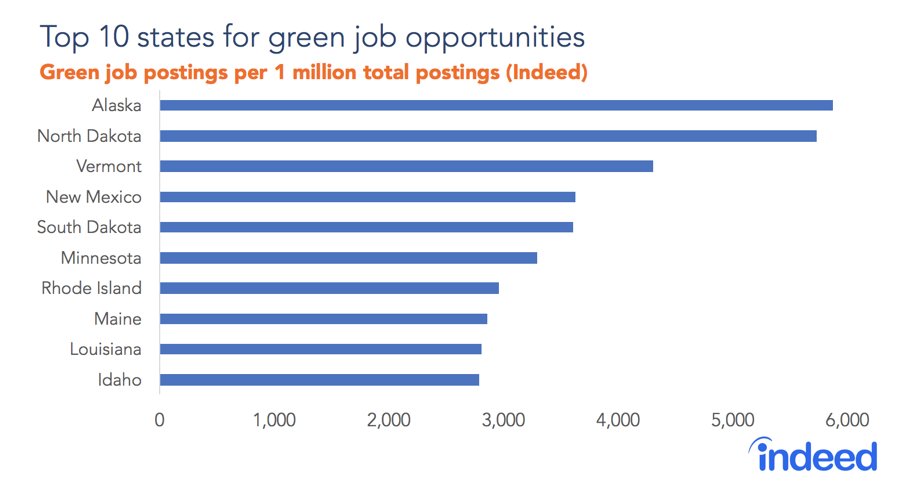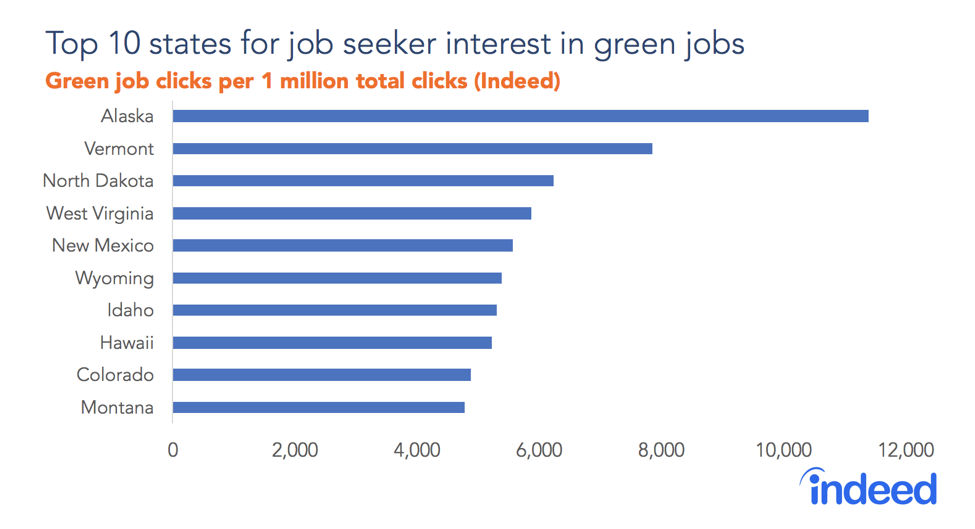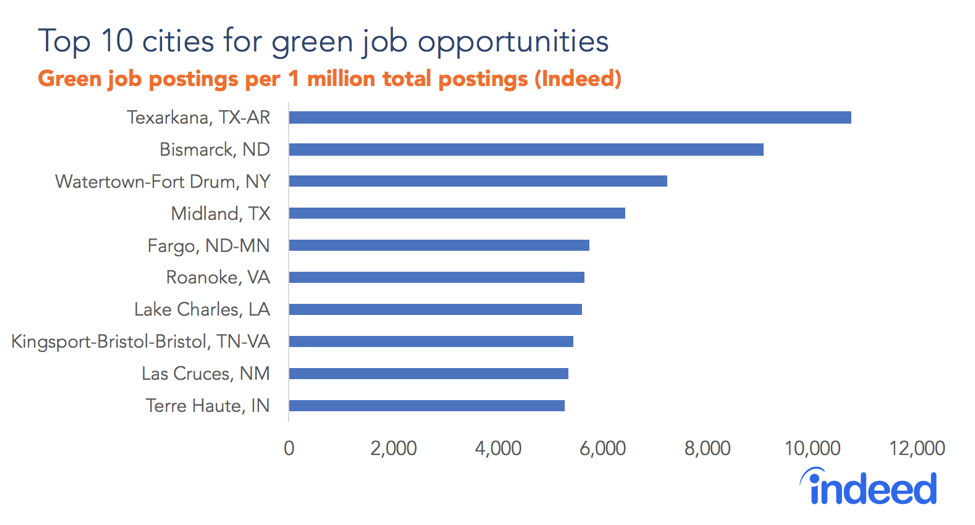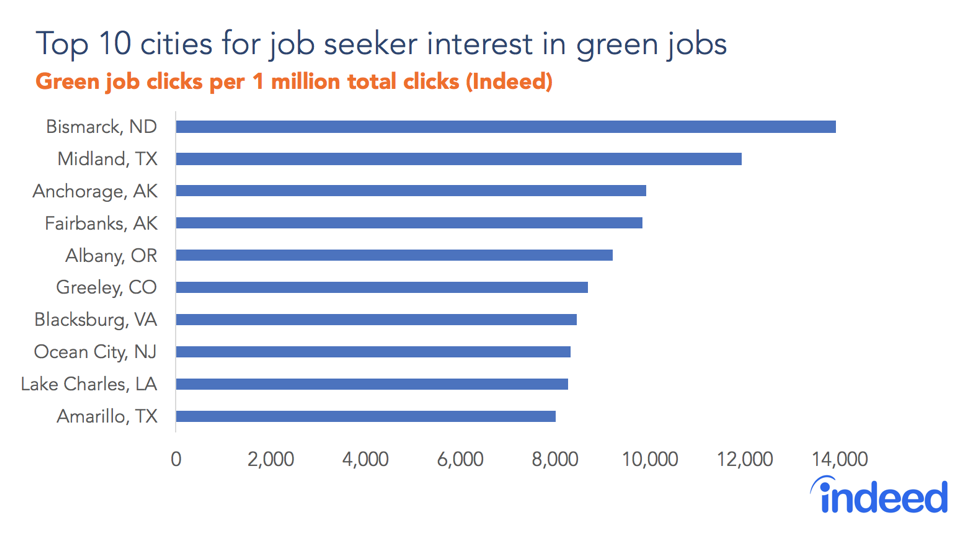Key points:
- Environmental specialist is by far the most common green job in the US.
- Alaska has the most green jobs postings and the most eager seekers of green jobs.
- Texarkana is the top city for green job postings, while jobs seekers in Bismarck show the most interest in green jobs.
Earth Day is April 22 and people all over the world will be celebrating environmental protection. But if you live in the US, how can you find work protecting the environment? What are the top green jobs? And where are they? As Earth Day approaches, Indeed has examined the top jobs and locations for environmental work, an update of an analysis we did last year.
Environmental specialist is the top green job in the US
The top green job in the US, by far, is an environmental specialist. As a share of all green jobs, there are more than four times as many postings for environmental specialists as the second most prevalent green job, environmental health, and safety officer. According to the Bureau of Labor Statistics, the median salary for environmental specialists is about $69,000 per year, and the number of jobs between 2016 and 2026 is projected to grow by 11%, which is faster than the average job. Environmental specialist was also the top position last year.

Alaska has the most green jobs and the most job seeker interest in green jobs
Alaska, North Dakota, and Vermont are the best states to find a job protecting the environment. About 5,900 job postings per million in Alaska are for green jobs, lifting the state from second in the rankings in 2016 to #1 in 2017. Kansas, Nevada, and Utah are the states with the fewest green job postings.

As for job seeker interest, Alaska also tops the list, and it’s not even close—with nearly 11,400 clicks per 1 million going toward green jobs. Vermont, North Dakota, West Virginia, and New Mexico round out the top 5. Illinois, Nevada, and Utah have the least amount of job seeker interest in green jobs.

Texarkana is the top city for green job postings, Bismarck for searches
Lying on the Texas/Arkansas border is the top city for green jobs: Texarkana. The metro area crosses both states and has a population of about 143,000 (as of 2010). In 2017, the area had about 10,700 green job postings per 1 million total postings, the best of any city. It’s not a coincidence that among the top cities for green jobs are several major hubs for the oil and gas industry: Bismarck, ND; Midland, TX; and Fargo, ND-MN. Where there are “dirty” jobs—such as mining and oil and gas extraction—green ones are plentiful, too.

While Texarkana is tops for green job postings, Bismarck is the city with the greatest job seeker interest. Over 13,900 clicks per 1 million total clicks originating in Bismarck are for green jobs. Midland is #2, followed by two cities in Alaska, Anchorage, and Fairbanks.

Green jobs are concentrated where “dirty” jobs are
An interesting relationship emerges in the US: In cities with higher concentrations of green jobs, there are also more “dirty” jobs—defined as mining, quarrying, and oil and gas extraction, to be specific. Some of the top cities for green jobs, like Bismarck and Midland, also have a lot of dirty jobs. Midland has the highest number of dirty jobs per capita, and also ranks No. 4 in green job postings; Bismarck is in the top 40 for dirty jobs, and yet is No. 1 for green job interest. Broadening this analysis, we examined the top 292 metros with the highest concentrations of dirty jobs, and there was a clear positive relationship between the concentration of green job postings and the number of dirty jobs per capita.
Why is this so? Perhaps because many oil and gas extraction companies need “green” employees—like environmental specialists—to comply with environmental regulations. Or perhaps because green jobs flow to where there is greatest need, just like any market; so more water treatment specialists are needed, for example, in areas with intensive fracking. Or, to speculate further, perhaps we find this correlation because the environment of these oil and gas-intensive cities may also be conducive to green energy (e.g., Bismarck, North Dakota has oil, but also the potential for wind energy). More research is needed to know just why green and dirty jobs tend to go hand-in-hand.
Methodology
For this analysis, we changed last year’s methodology. First, we looked at unique job postings for the calendar year 2017 by US state and metro area with job titles containing one or more of the following terms: biofuel, sustainability, sustainable, biomass, brownfield, climate, energy, environment, environmental, geothermal, green, hydroelectric, ecologist, methane, recycle, recycling, solar, photovoltaic, PV, thermal, wind, water, hydrology, hydrologist, geoscientist, geoscience, conservationist, climatology, climatologist, conservation, ecology, ecologist, ecological, ecosystem, biodiversity, and biodynamic.
Then from that list of job titles, we manually curated those jobs were clearly tied to protecting the environment. The end result was 26 job titles: environmental specialist, environmental health and safety officer, environmental technician, solar installer, water treatment specialist, environmental manager, environmental engineer, water resources engineer, environmental scientist; safety, health and environment assistant; director of environmental services, energy engineer, energy manager, water project manager, wind turbine technician, senior environmental engineer, environmental compliance specialist, recycling worker, environmental consultant, environmental health officer, senior environmental technician, wastewater operator, ecologist, senior environmental scientist, senior environmental specialist, and energy consultant.
We also counted the clicks by Indeed job seekers on these postings. We compared the counts of green jobs postings to total postings in each state or city to prevent large regions from dominating the analysis. For our job seeker interest score, we compared the average number of clicks for a green job posting to the average number of clicks per job overall in that state or city, to control for regional variations in uses by job seekers of the Indeed site.






